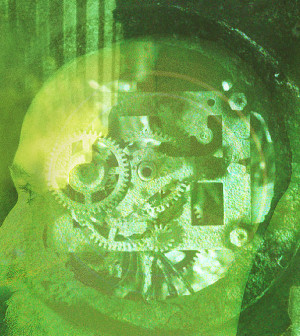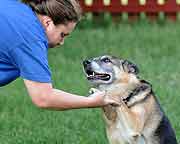- 7 Best Breads for Maintaining Stable Blood Sugar
- Gelatin vs. Collagen: Which is Best for Skin, Nails, and Joints?
- The Long-Term Effects of Daily Turmeric Supplements on Liver Health
- Could Your Grocery Store Meat Be Causing Recurring UTIs?
- Are You Making This Expensive Thermostat Error This Winter?
- Recognizing the Signs of Hypothyroidism
- 10 Strategies to Overcome Insomnia
- Could Artificial Sweeteners Be Aging the Brain Faster?
- Techniques for Soothing Your Nervous System
- Does the Water in Your House Smell Funny? Here’s Why
Dog Owners Help Scientists Get Inside Pooches’ Minds


Dog owners the world over are helping scientists get inside the head of man’s best friends.
Like humans, dogs have a unique set of mental skills they use to navigate their environment, the new research suggests. Some communicate well, others have better memories, and still others are better at taking their owner’s perspective, the Duke University study found.
“Most people think of intelligence as a glass that is more or less full. But intelligence is more like ice cream,” the study’s leader, Brian Hare, an associate professor of evolutionary anthropology, said in a Duke news release. “Everybody has different flavors. Being good at one thing doesn’t mean you will be good at everything else.”
In trying to understand the inner-workings of dogs’ minds, the researchers turned to pet owners for more insight. They analyzed information compiled by 500 dog owners on a website, Dognition.com, developed by Hare, who is also the founder of Duke’s Canine Cognition Center.
These people played the same games at home with their dogs that researchers use in the laboratory, to learn more about a canine’s thinking and problem-solving abilities.
“They’re just games,” said Hare. “The owners love playing them, and the dogs love playing them. I realized more people could play them if they were online.”
In one experiment, dogs looking for hidden treats were found to rely more on their memory than on their sense of smell. The dogs watched their owner hide a treat. The owners then covered their dog’s eyes and moved the treat. Most dogs looked for the treat in the last place they saw the food and didn’t sniff out its location with their nose, the researchers said.
“Most people think dogs use their sense of smell for everything,” Evan MacLean, co-director of the Canine Cognition Center, said in the news release. “But actually dogs use a whole range of senses when solving problems.”
In five out of seven tests, the researchers found the “citizen scientists” produced results similar to their own and those of other researchers, they reported in the Sept. 16 issue of PLoS ONE.
More than 17,000 dog owners around the world have signed up through Dognition and are providing researchers with the results of their games, according to the news release.
“The data these dog owners are producing is quality data. It matches the results we see coming out of the top research groups all over the world,” said MacLean.
“So much is possible when you have this much data,” added Hare. “I’m looking forward to dog owners answering all the big questions that have puzzled scientists for decades,” he said.
More information
The Humane Society has more about dogs and their behavior.
Source: HealthDay
Copyright © 2026 HealthDay. All rights reserved.










